Israeli forces are hunting the West Bank for the six Palestinian prisoners who made their escape nearly five days ago, leading to angry protests over the military occupation of Palestinian land. A Palestinian doctor was reportedly shot to death in Jerusalem today.
Reports from the West Bank and Gaza show Palestinians expressing great joy over the continued freedom of the six men, but also rage at their oppression.
There were widespread protests today in a “Day of Rage” in solidarity with the prisoners; and the Institute for Middle East Understanding reports that Israel killed a Palestinian doctor, Hazem Joulani, near a gate to Al-Aqsa mosque in the Old City. Mariam Barghouti confirms the killing.
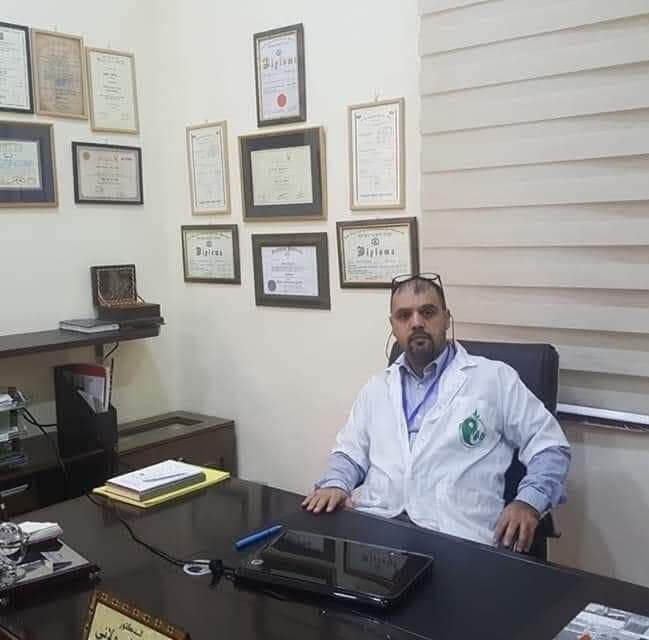
In its effort to track down the prisoners, Israel has reportedly poured troops into the West Bank and enacted closures of the occupied territory. Asharq al-Awsat:
Israel flooded the occupied West Bank with reinforcements on Wednesday in the manhunt for six Palestinians… Army chief Aviv Kohavi had decided to “reinforce troops… with combat battalions, observation troops and a number of aircrafts that are observing the area to assist in capturing the security prisoners and thwart terrorist attacks in the region”, the statement said.
Here is an arrest of a protester in Hebron, captured by APA Images in two photographs:
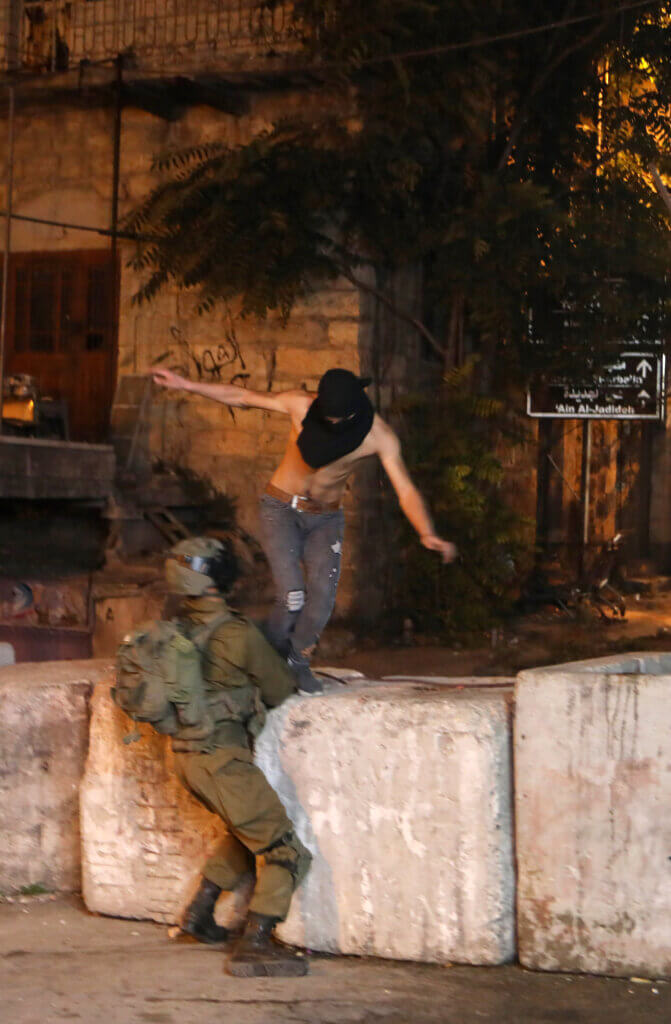
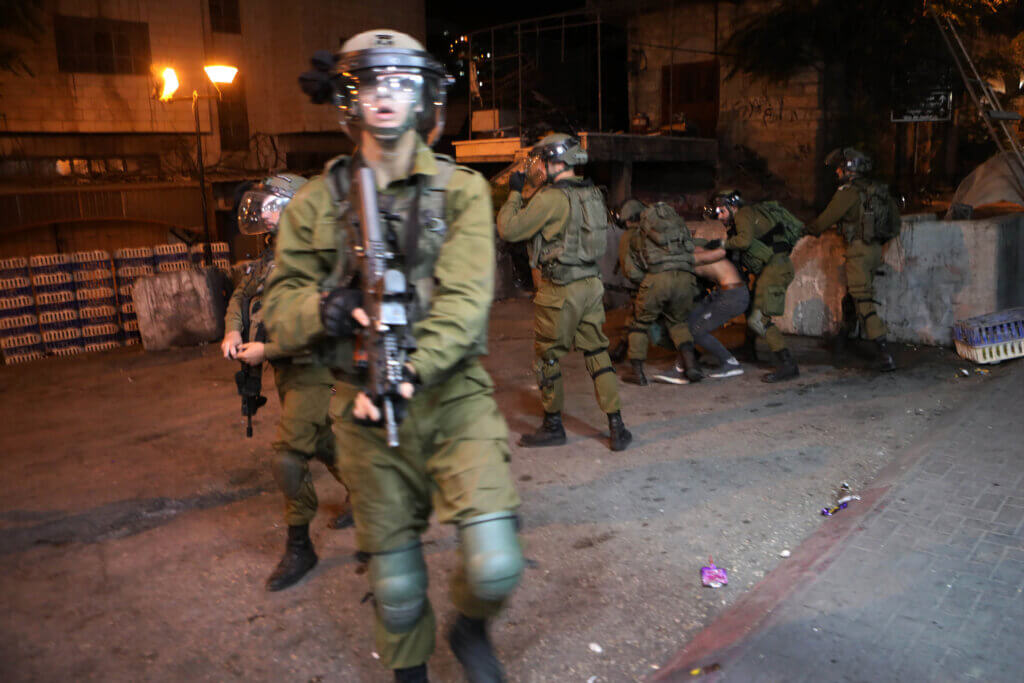
IMEU condemns Israel’s crackdown on prisoners’ families in an effort to find the men:
Israel has arrested three more family members of the escaped Palestinian prisoners. This is the latest in Israel’s massive wave of collective punishment following the prison break. According to international law, all collective punishment is illegal.
Jewish Voice for Peace condemns the methods that the Israeli authorities are employing to try to find the whereabouts of the escaped prisoners: “‘Mafia-style’ coercion from the ‘only Democracy in the Middle East’”.
The escaped prisoners are inspiring the protests. Al Jazeera quotes a Palestinian protester near the illegal Jewish settlement of Eviatar:
Muhammad Khabeisa, who has lost agricultural land to the settlement of Evyatar, told Al Jazeera his whole village backed the escaped prisoners.
“The prisoners in Palestinian jails are longing for freedom. They want to live their lives. They are not ordinary criminals, but patriots fighting for freedom,” he said.
Some of that joy and pride. At the Dome of the Rock, here’s a foto posted by Muhammad Smiry, an activist/journalist, of the symbol of the escape. The prisoners reportedly used spoons to dig their way out of the maximum security prison in Gilboa.
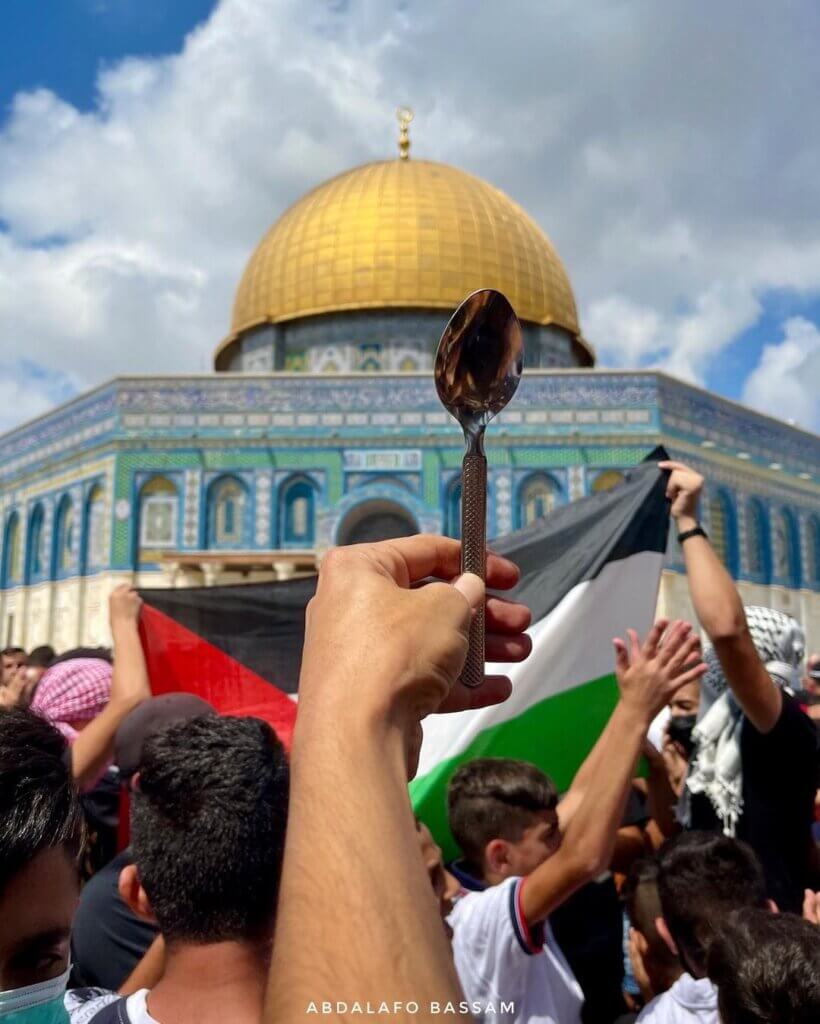
Artist Mohammed Sabaaneh has also highlighted the spoon.
A sculptor in Gaza exults over the escape.
More of the inspiration. “The freedom tunnel sparks the intifada of the prisoners” is the headline on the Palestinian daily Al Hayya al Jaadada, according to journalist Nasser Attah. The paper highlighted the wide scale protests by Palestinians across the West Bank.
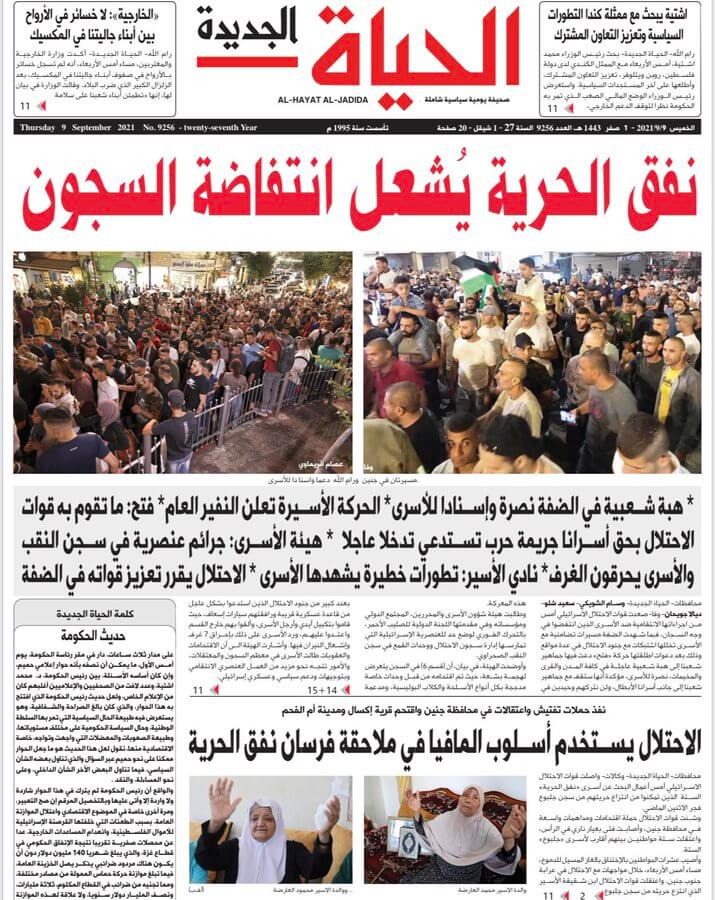
The inspiration is international. Maha Hussaini tweets a graffiti said to be from Italy. “As beautiful as the six Palestinians who escaped.”
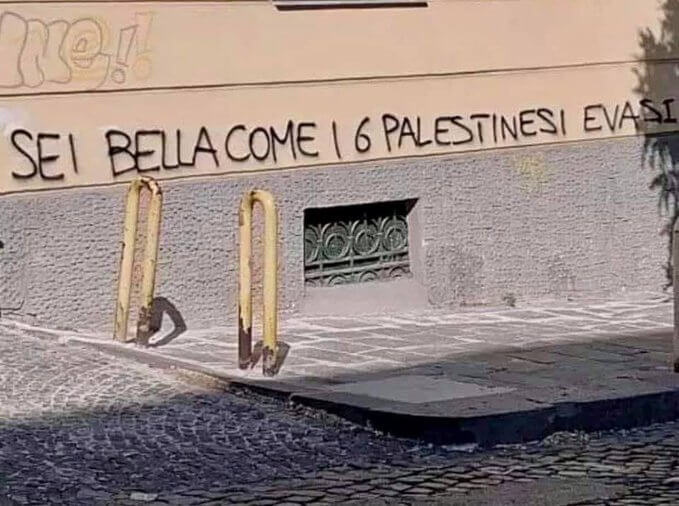
The “totally unexpected” escape has fired ideas of resistance to Israeli occupation, says Daoud Kuttab at Al Monitor:
The escape jolted public opinion in a way not seen for years. Palestinian Prime Minister Mohammad Shtayyeh told journalists that every prisoner wishes to be free and that Israel should free all prisoners…. there was no coordination at all with the Israelis. The combination of Fatah and Islamic Jihad — a collaboration that used to be strong — has reignited ideas of combined acts of resistance…
The situation in Israeli prisons has been volatile since the jailbreak, with guards appearing to take revenge on those under their control, and in return the prisoners have protested. In one prison in the Negev Desert prisoners burnt the contents of their own cells in an act of protest to the Israeli guards’ harsh treatment.
Nasser Atta tweets these images of violent protest/suppression of protest in Burqa, an occupied Palestinian village near Nablus, in which Palestinian youths appear to set an occupying jeep on fire with incendiary devices.
Middle East Monitor describes attacks on prisoners by Israeli authorities:
The Palestinian Authority yesterday warned Israel of the consequences of its continued attacks on Palestinian prisoners held in Israeli detention. “The PA’s senior officials have sent a clear message to Israel, warning it against continuing to attack and harm the Palestinian prisoners,” the Palestinian Prisoners’ Club chief, Qadura Fares, told Anadolu Agency.
Amira Hass reports from Jenin for Haaretz, explaining the ways that the six prisoners’ lives reflect Every Palestinian’s experience. She focuses on Zakaria Zubeidi, the most well-known escapee:
“Zakaria Zubeidi’s maternal grandfather, Mohammed Ali Jahjah, was one of the 66 prisoners who escaped from Israel’s Shata Prison in the major prison revolt of 1958. This detail in the family history was casually mentioned the other day by Zakaria’s uncle (on his father’s side), Jamal Zubeidi…
“Each of the six prisoners who managed to escape from Gilboa Prison has a family history that includes some or all of the following: life as a refugee; relatives shot dead by Israeli forces; childhood memories of military raids and home invasions; the expropriation of family-owned land for Jewish settlements; work in Israel; detentions; and participation in armed activity against the Israeli occupation….
“Israeli media outlets reduce and minimize the history of each of the six to the use of the term ‘terrorist,’ which in Hebrew also implies saboteur. But that sabotages the reader’s capacity to understand the choices they have made in their lives – and the love showered upon them by Palestinians and the joy the Palestinians derive from their daring and success in remaining free up to now. Even people who disagree with the path of Islamic Jihad and of Zubeidi see the six as being willing to make the greatest possible sacrifice (of life and liberty) for the continuation of the Palestinian fight for freedom.”
So where are the Palestinian voices in mainstream media?
Mondoweiss covers the full picture of the struggle for justice in Palestine. Read by tens of thousands of people each month, our truth-telling journalism is an essential counterweight to the propaganda that passes for news in mainstream and legacy media.
Our news and analysis is available to everyone – which is why we need your support. Please contribute so that we can continue to raise the voices of those who advocate for the rights of Palestinians to live in dignity and peace.
Palestinians today are struggling for their lives as mainstream media turns away. Please support journalism that amplifies the urgent voices calling for freedom and justice in Palestine.
Related posts:
Views: 0
 RSS Feed
RSS Feed

















 September 11th, 2021
September 11th, 2021  Awake Goy
Awake Goy  Posted in
Posted in  Tags:
Tags: 
















